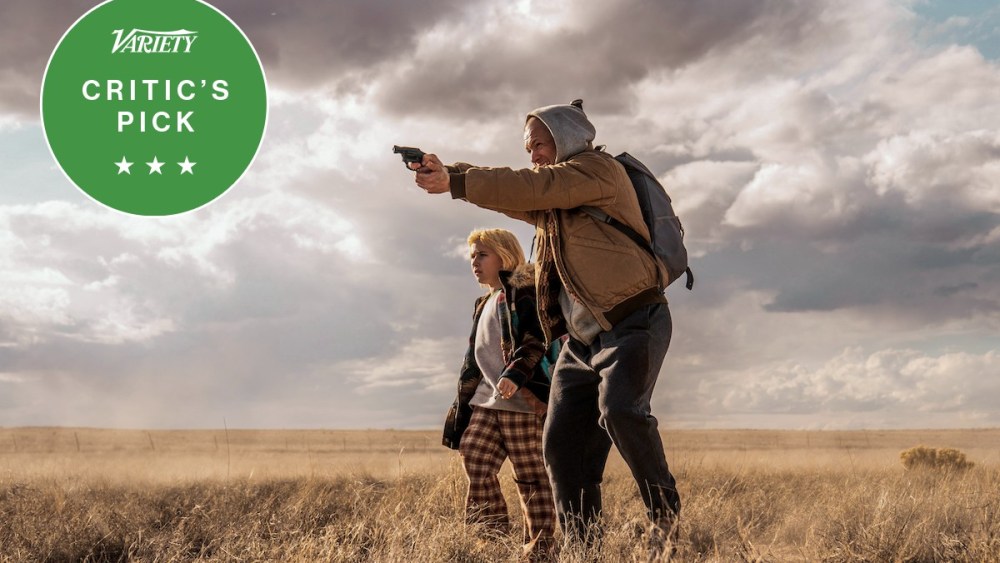While terms such as “pulse-pounding” and “nerve-racking” are tossed about far too frequently and capriciously in reviews of thrillers, they are altogether appropriate to describe “She Rides Shotgun.” Directed by Nick Rowland (“Calm With Horses,” TV’s “Ripper Street”), the exceptionally well-crafted and smartly paced indie drama grabs you from the get-go and constantly feels ready to explode even during sporadic moments of deceptive downtime. But the beating heart of the movie is the father-daughter relationship at its center that drives the story while lacing the sound and fury with heart and soul.
Things kick off on an ominous note as 11-year-old Polly (Ana Sophia Heger) continues to wait for her mom to pick her up at school long after her classmates and teachers have departed. When a car eventually does pull up, she’s not entirely relieved to see that it’s her estranged father, Nate (Taron Egerton), and not her mother, behind the wheel. As he beckons her to join him, you can’t help expecting the worst — especially after Polly notices Nate has hotwired the ignition. But no, “She Rides Shotgun” has something even more alarming in store.
Only gradually does Polly learn, along with the audience, that Nate, newly released from prison, has arrived to retrieve her before she’s grabbed by members of the Aryan gang that Nate “upset” (as he euphemistically puts it) while behind bars. The bad guys have sent word throughout New Mexico that Nate and everyone close to him should be killed. Polly’s mom and stepfather have already been terminated, and now her dad is determined to save his daughter, if not himself, from grievous bodily harm.
Working from a novel by Jordan Harper, who co-wrote the solid screenplay adaptation with Ben Collins and Luke Piotrowski, Rowland ratchets up the suspense with cunning and confidence, advancing the narrative and introducing secondary characters with suitable swiftness and meticulous precision that never call undue attention to themselves.
An early, seemingly random appearance by a cop named John Park (Rob Yang) investigating the double homicide of Polly’s mother and stepfather pays off when the girl, initially fearing Nate is responsible for the killings, slips away from the seedy motel room where she and her dad are hiding out and calls the cops. One thing leads to another while the stakes are raised, and Park also pursues an apparently unrelated case involving “the meth lab to end all meth labs.” (Kudos to Yang for breathing fresh life into the cliché of a cop remaining calmly reasonable when facing someone aiming a gun at him.)
Not altogether surprisingly, the cases actually turn out to be closely linked — by Houser (a scarily persuasive John Carroll Lynch), a transparently corrupt and fearsomely sadistic sheriff who runs the meth operation with members of the aforementioned Aryan gang.
“It’s Troy,” Park says of the stronghold he wants to infiltrate. “I need a horse.” And he’s perfectly willing to saddle up a fugitive, wrongly accused or otherwise, to achieve his goal.
Long before all hell breaks loose at the secluded meth lab, Rowland — with the invaluable assistance of editor Julie Monroe and DP Wyatt Garfield — amps the thrill quotient with action set-pieces both elaborate (a high-speed highway chase that has Nate and Polly pursued by police) and intimate (a kinetic gunfight within the cramped confines of a motel room).
Time and again, Garfield impresses with potent compositions, particularly in a scene that depicts father and daughter obliviously walking through a field in the foreground while, in the right-hand corner of the screen, a distant car slowly bears down upon them. Later, Garfield ingeniously devises the knockout equivalent of a split-screen effect as Polly races along a desert path, while over the rise just above her, a humongous shootout ensues.
As exhilarating as these and other moments are, however, they would not be nearly so impactful had Rowland not so effectively encouraged our emotional investment in the relationship between Nate and Polly. Whether he’s affectionately dying her brown hair blond so she can avoid being recognized or teaching her to wield a baseball bat to discourage much larger attackers, Nate remains sincerely anxious about his daughter’s safety, a trait Egerton compellingly expresses without ever soft-pedaling the hard-boiled dangerousness Nate can flip on like a light switch.
Likewise, Polly comes across so toughened by her experiences that we never lose sight of the fact that this is an innocent child repeatedly in mortal peril. It’s a tricky balancing act that Heger pulls off flawlessly. When her character has to sacrifice her beloved teddy bear for the greater good, it’s positively heartbreaking.
There are some joltingly funny moments sprinkled throughout “She Rides Shotgun,” almost all of them flowing naturally from the sometimes wary, sometimes warm, always credible relationship limned by Egerton and Heger. At one point, a service station minimart hold-up goes terribly and almost fatally sideways when an unexpected customer opens fire. Nate barely makes it back to their car, where he can’t help grimacing when a deeply concerned Polly remarks, “He shot you.”
“He did,” Nate calmly replies, reflexively downplaying the seriousness of the situation. “A little.”
Not to worry, though: He promised her he’d grab her a Snickers bar while committing his crime inside. And he did.


